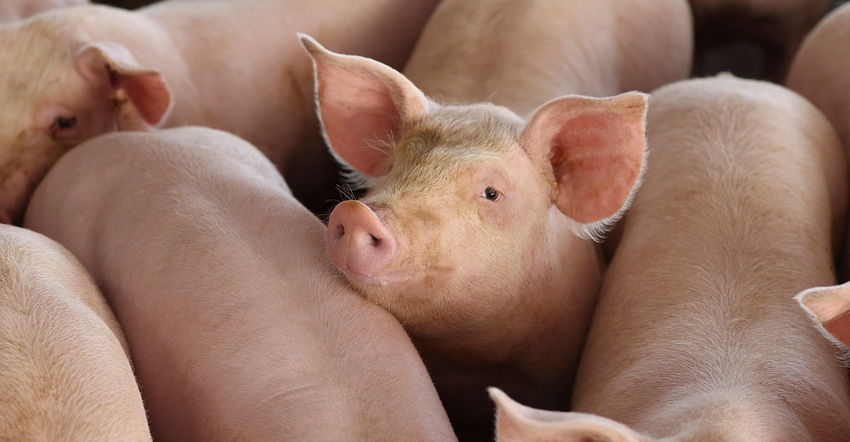As monophasic Salmonella continues to put pressure on producers, a comprehensive vaccination strategy can lessen the clinical impact of the pathogen.
October 1, 2022

Sponsored Content
Disease prevention from a pig health and performance standpoint is a widely adopted practice across the pork industry, but it can also play a role in supporting food safety. Today, with growing pressure and government regulation to reduce Salmonella at processing plants, controlling the bacterium at the barn level is becoming increasingly critical for producers.
Monophasic Salmonella I 4,[5],12:i:-, a variant of the Salmonella Typhimurium serotype, has emerged in recent years as the predominant Salmonella serotype isolated from clinical cases in the U.S. swine population, and has become the most frequent multi-drug-resistant Salmonella serotype affecting humans in the country.1–2 Infection can cause clinical disease in pigs as well as pose a public health threat as a foodborne pathogen.3
With the USDA Food Safety and Inspection Service proposing new performance standards for Salmonella in pork,4 there is mounting pressure on producers to prioritize strategies that reduce Salmonella in their herds; specifically, the colonization, shedding and transmission of the pathogen.
Boehringer Ingelheim is committed to research and innovation to help their products keep pace with emerging and evolving threats. Enterisol Salmonella T/C® is the first and only oral avirulent live vaccine to contain both strains of Salmonella Typhimurium and Salmonella Choleraesuis. And until recently, no commercial vaccines had proven protection against the monophasic serovar, but recent research shows ENTERISOL SALMONELLA T/C confers protection against monophasic Salmonella as measured by decreased clinical signs, intestinal lesions and improved average daily gain.5 The vaccine is the first and only commercially available vaccine in the United States to demonstrate this protection. 5–6
A new study that examined whether ENTERISOL SALMONELLA T/C confers protection against the monophasic variant as measured by lymph node colonization and fecal shedding is continuing to demonstrate the effectiveness of the vaccine against this most prevalent serovar. These new findings specific to lymph node colonization are significant, given lymph nodes can be present in comminuted pork products.7 Because lymph nodes can contain Salmonella and also remain in a final pork product, pre-harvest control strategies that help reduce Salmonella are especially important.
“We’d already shown the health and performance benefits of the vaccine against a monophasic Salmonella challenge,” said Fernando Leite DVM, technical manager for Enteric Diseases at Boehringer Ingelheim. “But we felt it was necessary to look closer at lymph node colonization and shedding, given that these are important parameters that impact the control of this pathogen.”
A randomized, controlled, blinded study evaluated 60 pigs across three different treatment groups: 1) non-vaccinated, non-challenged; 2) non-vaccinated, challenged; and 3) pigs vaccinated with ENTERISOL SALMONELLA T/C and challenged. Pigs were challenged with monophasic Salmonella at four weeks post vaccination, or approximately 7 weeks of age. Fecal samples were collected over 14 days post infection (dpi); then, pigs were euthanized, and ileocecal lymph nodes (ICLN) were collected for Salmonella culture and quantification.
Overall, the results of the study demonstrate that ENTERISOL SALMONELLA T/C vaccination can significantly reduce lymph node colonization and shedding of monophasic Salmonella in swine, compared to non-vaccinated, challenged pigs. Vaccinated pigs had a significantly reduced average ICLN Salmonella level (1.32 log10 cfu/gram), compared to non-vaccinated, challenged pigs (2.5 log10 cfu/gram). This represented a significant reduction of both the level of colonization as well as the number of pigs colonized with Salmonella in the vaccinated group (p<0.05). Finally, a significant reduction of shedding in the vaccinated group was observed on 3 dpi and on each subsequent time point following the challenge. By 14 dpi, pigs vaccinated with ENTERISOL SALMONELLA T/C presented a significant (p<0.05) 100-fold decrease in average shedding level (1.4 log10 cfu/gram) compared to non-vaccinated, challenged pigs (3.5 log10 cfu/gram).8
For more information, view the full study results or contact your Boehringer Ingelheim representative.
References
1 Naberhaus SA, Krull AC, Brader LK, et. al., Emergence of Salmonella enterica serovar 4,[5],12:i:- as the primary serovar identified from swine clinical samples and development of a multiplex real-time PCR for improved Salmonella serovar-level identification. J Vet Diagn Invest 2019;31(6):818–827.
2 Trachsel JM, Bearson BL, Brunelle BW, Bearson SMD. Relationship and distribution of Salmonella enterica serovar I 4,[5],12:i:- strain sequences in the NCBI Pathogen Detection database. BMC Genomics2022;6;23(1):268. doi: 10.1186/s12864-022-08458-z.
3 Shippy DC, Bearson BL, Holman DB, et al., Porcine response to a multi-drug-resistant Salmonella enterica serovar I 4,[5],12:i:- outbreak isolate. Foodborne Pathog Dis 2018;15(5):253-261.
4 USDA FSIS Changes to the Salmonella verification testing program: proposed performance standards for Salmonella in raw comminuted ork and Intact or Non-Intact Pork Cuts and Related Agency Verification Procedures. https://www.fsis.usda.gov/policy/federal-register-rulemaking/federal-register-notices/changes-salmonella-verification-0. Accessed July 22, 2022.
5 Leite F, Arruda P, Jordan D, Bearson S. An evaluation of Enterisol Salmonella T/C® vaccine in conferring protection against Salmonella enterica serovar I 4,[5],12:i:-. Allen D. Leman Swine Conf 2021.
6 Swine Health Information Center. Salmonella enterica subsp. enterics 1,4,[5],12:i:-. 2021. Available at: https://www.swinehealth.org/wp-content/uploads/2021/04/Salmonella-14512i-.pdf. Accessed July 22, 2022.
7 Miller M, Maher JM, Wiseman B, Gragg SE Salmonella is present in multiple lymph nodes of market hog carcasses at slaughter. Food Protect Trends 2022;42(2):100–106
8 Leite F, Arruda P, Jordan D, Bearson S. Evaluation of the effect of Enterisol Salmonella T/C® on the shedding and lymph node colonization of multi-drug- resistant monophasic Salmonella enterica serovar 4,[5],12:i:-. Allen D. Leman Swine Conf 2022.
ENTERISOL SALMONELLA T/C® is a registered trademark of Boehringer Ingelheim Vetmedica GmbH, used under license. ©2022 Boehringer Ingelheim Animal Health USA Inc., Duluth, GA. All Rights Reserved. US-POR-0189-2022
About the Author(s)
You May Also Like



